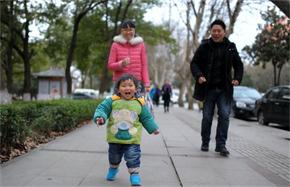Too early to judge family planning policy
More importantly, it would be illuminating to examine the behavioral traits of single children across countries, rather than focusing only on China and the results of its family planning policy, because the number of single children has also in many other countries and regions, too.
According to the 2000 World Population Data Sheet of the Population Reference Bureau, the total fertility rate is 1.5 for the Republic of Korea, 1.3 for Japan, 1.2 for Russia and 1.0 for Hong Kong, all of which are lower than the Chinese mainland's. If single children in low total fertility rate countries and regions have behavioral traits similar to those on the mainland, then it should be considered a general phenomenon, not the result of the family planning policy.
Besides, when it comes to the study of population policies, we cannot overlook the quality of the overall population and people's livelihoods. Countries with lower fertility rates have populations of "higher quality". In 2000, Europe's total fertility rate was 1.4, while Asia's and Africa's were 3.3 and 5.3, and obviously Europe led in the quality of population, followed by Asia and Africa.
Let's take the situation in China. Generally, urban residents have one child while rural households have two children, so the quality of the overall population of urban children is higher than that of their rural counterparts. The reason is simple: fewer people mean better exposure and access to resources.
Based on the General Equilibrium Theory of Gary S. Becker and the Human Capital Theory of Theodore W. Schultz, both economics Nobel Prize winners, it is the objective requirement of human capital in modern industrialized society that the number of children should be substituted for the quality of children.
The drop in fertility rate and the rise in the number of single children are also the natural response of couples of childbearing age because of the fear of unemployment during society's transition from a labor-intensive to a capital-intensive market.
If single children in China have more behavioral weaknesses than their Western counterparts, then education may be to blame - though spoiled by parents and overwhelmed by the exam-oriented education system, some single children do lack sound development.
Finally, our planet faces multiple crises of food, energy and other resources, and deteriorating environment and ecology. But despite that the number of impoverished people continues to grow drastically. In such a situation, demographers should attend to the common tasks of humanity and find ways to realize zero population growth in the world.
Stereotype research hurts. Moreover, it is too early to judge China's single children under the current population policy. If at all single children are to be judged, the responsibility should be taken up by future generations.
The author is a demographer with the Chinese Academy of Social Sciences.
(China Daily 01/28/2013 page9)


















